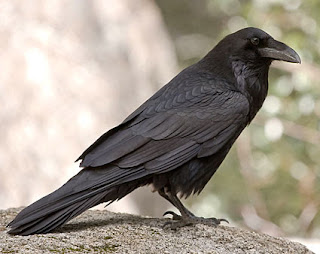The common raven (Corvus corax), also known as the western raven or northern raven when discussing the raven at the subspecies level, is a large all-black passerine bird. Found across the Northern Hemisphere, it is the most widely distributed of all corvids. There are at least eight subspecies with little variation in appearance, although recent research has demonstrated significant genetic differences among populations from various regions. It is one of the two largest corvids, alongside the thick-billed raven, and is possibly the heaviest passerine bird; at maturity, the common raven averages 25 inches in length and 2.6 pounds in mass. Although their typical lifespan is considerably shorter, common ravens can live more than 23 years in the wild. Young birds may travel in flocks but later mate for life, with each mated pair defending a territory.
Common ravens have coexisted with humans for thousands of years and in some areas have been so numerous that people have regarded them as pests. Part of their success as a species is due to their omnivorous diet: they are extremely versatile and opportunistic in finding sources of nutrition, feeding on carrion, insects, cereal grains, berries, fruit, small animals, nesting birds, and food waste.
Some notable feats of problem-solving provide evidence that the common raven is unusually intelligent. Over the centuries, it has been the subject of mythology, folklore, art, and literature. In many cultures, including the indigenous cultures of Scandinavia, ancient Ireland and Wales, Bhutan, the northwest coast of North America, and Siberia and northeast Asia, the common raven has been revered as a spiritual figure or godlike creature.
Most common ravens prefer wooded areas with large expanses of open land nearby, or coastal regions for their nesting sites and feeding grounds. In some areas of dense human population, such as California in the United States, they take advantage of a plentiful food supply and have seen a surge in their numbers. On coasts, individuals of this species are often evenly distributed and prefer to build their nest sites along sea cliffs. Common ravens are often located in coastal regions because these areas provide easy access to water and a variety of food sources. Also, coastal regions have stable weather patterns without extreme cold or hot temperatures.
Common ravens usually travel in mated pairs, although young birds may form flocks. Relationships between common ravens are often quarrelsome, yet they demonstrate considerable devotion to their families.
Females lay between three and seven pale bluish-green, brown-blotched eggs. Incubation is about 18 to 21 days, by the female only. The male may stand or crouch over the young, sheltering but not actually brooding them. Young fledge at 35 to 42 days, and are fed by both parents. They stay with their parents for another six months after fledging.
The brain of the common raven is among the largest of any bird species. Specifically, their hyperpallium is large for a bird. They display ability in problem-solving, as well as other cognitive processes such as imitation and insight.
When it comes to pizza, we all want that yummy pepperoni and cheesy taste, without all the extra carbs that comes from the crust. So, we decided to take that classic pepperoni pizza taste, and team it up with chicken breast! It's an ooey-gooey, cheesy, pepperoni-perfect recipe that we know you're gonna love.
- 4 boneless, skinless chicken breasts, lightly pounded
- Salt for sprinkling
- Black pepper for sprinkling
- 1/2 cup bread crumbs
- 1 teaspoon garlic powder
- 1/2 cup pizza sauce
- 3/4 cup shredded mozzarella cheese
- 16 slices pepperoni
- Dried oregano for sprinkling
- Preheat oven to 375º. Coat a baking sheet with cooking spray. Sprinkle chicken evenly with salt and pepper.
- In a shallow dish, combine bread crumbs and garlic powder; mix well. Dip chicken into bread crumb mixture, coating evenly on both sides. Place on baking sheet.
- Bake 15 minutes. Remove chicken from oven, top evenly with pizza sauce, mozzarella cheese, and pepperoni. Sprinkle lightly with oregano. Place back in oven and bake 8 to 10 minutes more or until no longer pink in center. Serve immediately.
1922 – Nancy Walker, American actress (d. 1992)

- Use an old towel bar on your potting bench and hang S hooks to store your tools.
- Broken dresser drawers become bookshelves or under-bed storage.
- How many ways can you repurpose an unused wine rack?
- storage for towels in the bathroom
- take it to the craft area for all the small tools, glue and yarn
- store water bottles and travel mugs
- Tissue boxes make terrific storage for plastic bags, but they also work well for used dryer sheets. Reuse the dryer sheets to wipe down the washer and dryer to keep it dust-free and clean out the lint trap.
- Use old magazine racks to store cutting boards, baking sheets, and other flat kitchen items.













